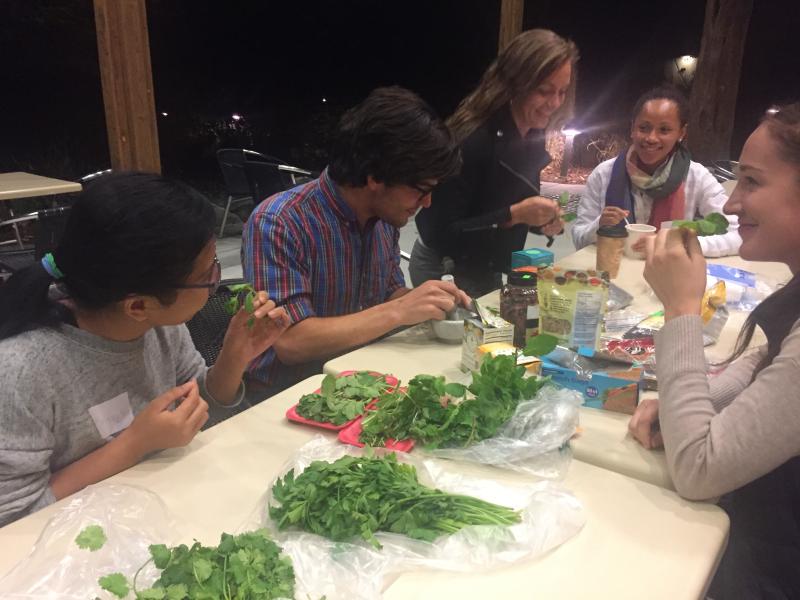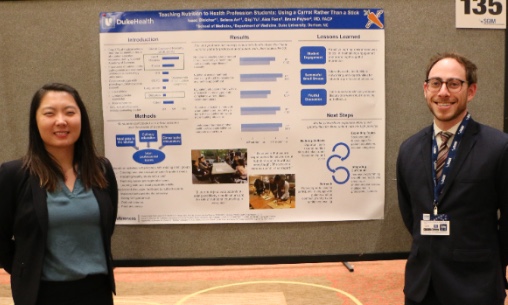
Over two years ago, Dr. Bruce Peyser received funding to start a pilot project with Duke medical students to teach learners about nutrition. They adopted an interdisciplinary approach and invited students from the medical school, nursing school, and the PA program to evening seminars that included a healthy chef cooked meal while learning from presentations about nutrition.
From this pilot, Peyser then applied for a Duke Ahead grant to continue the project for another year.
"We had some good success, the program was well received, and everyone enjoyed eating and learning," said Peyser.
The team collected data and and made a poster that was presented at conferences, such as NC ACP and SGIM. 
Changing Curriculum
Because of this work, the team put together a proposal at the medical school to offer a fourth year elective for students who might be interested in culinary medicine. They're now anticipating a course will be up and running within the next year.
"We were able to take a pretty exciting and unusual approach to learning about nutrition, leverage it to make it effective and fun, and now we should be able to make a small and yet very positive change in the curriculum at the medical school," says Peyser.
Project Summary:
Title: Teaching Nutrition to Health Professional Students: Using a Carrot Rather Than a Stick
Needs and Objectives: Despite increasing rates of obesity, diabetes, and other lifestyle-dependent diseases, U.S health profession schools provide minimal nutrition education. Graduate programs include significantly less class time on nutrition than national recommendations and much of this time targets biochemistry rather than practical nutrition counseling for patients. To address this gap, we developed an innovative, inter-professional curriculum to increase health profession students’ knowledge about nutrition, behavioral intervention for patients, and the role of other health professionals in providing nutrition counseling.
Setting and Participants: Eighty graduate health profession students at Duke were enrolled in a four-session curriculum.
Description: At each session, students participated in interactive cooking demonstrations led by a chef experienced in nutrition education, followed by a roundtable discussion of nutrition topics led by subject matter experts. These topics included macronutrients, the diet interview, and discussions on hypertension, diabetes, and cancer. Case-based learning and role-play based tutorials was integrated into each session.
Evaluation: The program was assessed using a pre- and post-intervention design (n=39 paired responses) using validated surveys on nutrition counseling and inter-professional education. Participants showed a significant increase in the belief that nutrition counseling should be provided by all health care professionals (p=0.02) and that nutrition assessment and counseling should be part of all routine appointments (p=0.02). Participants also more strongly believed that nutrition education for patients would increase patients’ compliance with nutrition recommendations (p=0.03). In terms of inter-professional teamwork, students showed increasing agreement that patient satisfaction would improve as a result of treatment and management by an inter-professional team (p<0.01) and that they better understood the role of other health care professionals in an inter-professional team (p<0.01).
Discussion: This program provided an opportunity to learn about nutrition topics not covered by standard curricula. Students developed innovative ideas to address patients’ barriers to healthy diets and used them to role-play a variety of patient scenarios. Students also learned about the coordination required among healthcare disciplines to provide effective nutrition intervention. Finally, with the experience of meal preparation, students better understood the changes asked of patients as part of nutrition intervention. The results indicated that participants were better prepared to discuss healthy cooking within an evidence-based framework and develop strategies for helping patients overcome challenges.
Impact: A holistic approach to nutrition education utilizing multiple learning styles was key to maintaining student engagement in this critical topic. Students have already begun to incorporate these practical lessons into their clinical work by conducting nutrition counseling with patients.